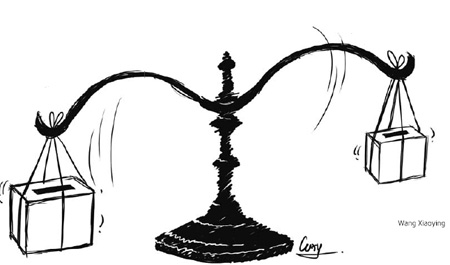Draft alone cannot ensure equal rights for farmers
A draft amendment, granting rural residents the same rights as their urban counterparts to choose deputies to people's congresses, may be submitted to the country's top legislature (National People's Congress, or NPC) this month for a second reading. The NPC held the first discussion in October on the draft amendment that, if passed, would make it possible for voters across China to exercise equal rights in choosing deputies to people's congresses, including the NPC.
But Beijing-based lawyer Duan Jun says the draft amendment is not likely to improve matters significantly until serious efforts are made to bridge the urban-rural gap simultaneously. The draft designed to choose the same proportionate number of deputies both in the rural and urban areas alone cannot resolve China's rural issues.
"The Electoral Law has been revised several times. And despite the change being more thorough this time it may still not achieve a breakthrough because rural problems have continued unchanged even after earlier revisions," Duan says. The country's first Electoral Law was passed in 1953. But the imbalance between deputies from urban and rural areas has existed despite the principle of indiscriminate equality before the law that is written into our Constitution.

This imbalance was partly rectified twice -in 1955 and at the beginning of the reform and opening up, which began 30 years ago. Though the ratio of deputies from among urban and rural residents has narrowed from 8:1 to 4:1, in real life the bias against rural residents has not changed. "For example, migrant workers receive lower wages than their local counterparts and have no insurance cover for doing the same job. Plus, the overall payment level of migrant workers hasn't increased much over the years, even though their hard work has contributed a lot to the rapid economic development of the country," he says.
Duan remains skeptical about whether the draft amendment will resolve all the intractable issues, such as better payment and equal access for rural workers to social welfare. The most important determinants to improving rural people's life and surroundings are the rural governance structure and whether they have the right and freedom to dispose of their land use rights.
Just last week, a woman in Chengdu, Sichuan province, self-immolated herself in protest against the forcible demolition of her house when the local government took the land back.
"The government has shifted its focus on the development of the vast countryside in recent years. But despite the adoption of a series of incentives and burden-easing policies such as tax relief in rural areas not all people have benefited because of the rural governance structure," Duan says.
The existing system grants too much power to village heads and lacks measures to prevent them from taking advantage of public policies for personal or family gains. That's precisely why the direct election of village heads by villagers across the country was embroiled in controversies and scandals, with some candidates being accused of "buying votes", he says.
"What needs to be done more urgently is to reform the grassroots governance structure so that more people's voices can be heard and their interests better protected. This is a precondition for the draft's success if it is passed in its present form or else it will still be uncertain whether even more deputies can report rural voters' real needs and requirements."
Frankly speaking, the draft is a bold attempt, a great step forward, toward strengthening social equality, especially for improving farmers' lives and economic condition. But it still needs a set of supplementary measures. To belatedly grant equal voting rights to farmers through paperwork is one thing, and to ensure they can exercise them is another.
Another major legal impediment is that people in rural areas are still barred by regulations to trade the land in their possession in the housing market. "Legally, it's a serious discrimination against rural residents, who, too, should enjoy the rights and freedom that their urban counterparts do in trading their land use rights. This reasonless ban is partly responsible for the skyrocketing housing prices, too," Duan says.
How can the passage of the draft ensure that rural people will enjoy the same rights as their urban counterparts if such policies and regulations are not abolished? Besides, Duan urges the country to learn from the West's experiences.
"So far attention has only been paid to the population or the proportion of population that deputies represent, but few try to find out whether these deputies are well educated and competent enough to carry out the duties and powers entrusted to them." To judge a deputy's performance, people should have the right to comment directly on his/her performance, rather than having a bunch of so-called experts to say yes or no.
Duan disagrees with the popular opinion that deputies' "quality" should be improved first so that they can better embody the people's will. His logic is the opposite. "Putting people's will first and letting them vote directly will enable them to choose the right deputies and dismiss the ones not qualified more quickly. Therefore, the entire situation will improve much faster." That is fundamental for rural people to exercise the equal rights endowed by the draft, he says.

(China Daily 12/08/2009 page9)














